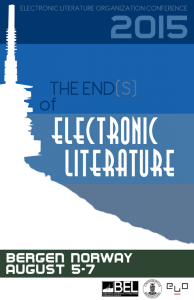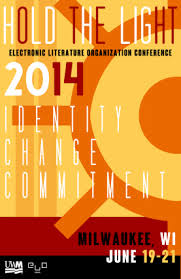ELO is proud to announce the first winners of the “The N. Katherine Hayles Award for Criticism of Electronic Literature†and “The Robert Coover Award for a Work of Electronic Literature,†two new annual awards in the field.  Designed to draw attention to the rising tide in this area, these awards awards mark a significant new initiative in ELO’s support of scholarship and art in the world of digital literature.
The winner of the Coover award is Jason Edward Lewis for his work, “Vital to the General Public Welfare†(The PoEMM Cycle), and the winner of the Hayles Award is Johannes Heldén & HÃ¥kan Jonson for their work, Evolution. Honorary Mention for the Coover Award goes to Aaron Reed for “18 Cadence.â€Â  Honorary Mention for the Hayles Award goes Calum Rodger for “Reading the Drones: Working Towards a Critical Tradition of Interactive Poetry Generation.â€Â  Below is the official announcement of the awards.
“The Robert Coover Award for a Work of Electronic Literatureâ€
“The Robert Coover Award for a Work of Electronic Literature†saw 18 submissions from Spain, the US, Australia, Peru, the UK, Sweden, Italy, and Brazil. The Criteria Workgroup that developed the Submission Guidelines for the Award included Judy Malloy, Jennifer Ley, Laura Zaylea, and Brian Kim Stefans. The Jury consisted of Bobby Arellano, Christine Wilks, Patrick LeMieux, and Luciana Gattass.
The winner of this award is Jason Edward Lewis for his work, “Vital to the General Public Welfare†(The PoEMM Cycle).
This work is, according to one Jurist, “[i]n its entirety . . . very impressive and most enjoyable to read. There’s a marvellous range of different modalities combined with touch interaction, used to great poetic, narrative and thematic effect. . . . These works are at the cutting edge of electronic literature and stand out in the way they thoroughly embrace interactive reading in the multi-touch, multi-screen present and future.†Another wrote, “This is serious poetry and beautifully designed in an ambitious project cycle.â€
Honorary Mention goes to Aaron Reed for “18 Cadence.â€
One Jurist remarked that “’18 Cadence†“combines interactive fiction with a memetic, cut-and-paste interface that allows reader and player to become the maker of their own microstories. ‘18 Cadence’ is a beautifully designed, complex reading experience not only of a hundred years of one house, but of those fictions produced by other readers.â€Â Another wrote, “Engaging story, intentionally minimalist, encouraged discovery as well as play in a multi-modal synchronous interface.â€
“The Robert Coover Award for a Work of Electronic Literature†is an award given for the best work of electronic literature of any length or genre. Bestowed by the Electronic Literature Organization and funded through a generous donation from supporters and members of the ELO, this $1000 annual prize aims to recognize creative excellence. The prize comes with a plaque showing the name of the winner and an acknowledgement of the achievement, and a one-year membership in the Electronic Literature Organization at the Associate Level.
“The N. Katherine Hayles Award for Criticism of Electronic Literature”
“The N. Katherine Hayles Award for Criticism of Electronic Literature” saw 9 submissions, consisting of four books and five articles by scholars from the UK, Canada, Sweden, Germany, Portugal, and Scotland. The Criteria Workgroup that created the Submission Guidelines for the award included Matt Kirschenbaum, Chris Funkhouser, and Rita Raley. The Jury consisted of Jill Walker, Anastasia Salter, Pat Jagoda, and Stephanie Boluk.
The Winner of this award is Johannes Heldén & Håkan Jonson for their work, Evolution.
“Evolution†by Johannes Heldén & HÃ¥kan Jonson, wrote one Jurist, “an interesting critical-creative experiment. . . . [that] captures the boundary crossing spirit of the ELO.†Another wrote that “Evolution†“is both a work of literature and multi-voiced, multi-modal criticism.†Another wrote that “this collection of seven short critical responses to the generative poem Evolution by Johannes Heldén and HÃ¥kan Jonson plays with the genre of criticism by enclosing the essays within over 200 pages of code. . . .  Each of the essays in this collection is poetic and thought-provoking in its own way. . . .  The rest of the book is left to the code itself, and to logs of its output. Perhaps the book was written, compiled, designed by Evolution itself. Even the table of contents looks like computer code, laid out the way that a piece of software might prefer. I’m ranking this book first on my list because of its challenges to the form of criticism – there is a creativity and unexpectedness in the way that these responses to the text are presented that is very engaging and that contributes to the work and to the field in general.â€
Honorary Mention goes to Calum Rodger for “Reading the Drones: Working Towards a Critical Tradition of Interactive Poetry Generation.â€
One Jurist wrote that “this essay offers an extremely clear and useful intervention into why we should study Interactive Poetry Generation in literary criticism.†Another said that it “combines a wide-ranging knowledge of conceptual poetry with computation†and “offers many lucid insights in an under-examined field of literary and media practice.â€
“The N. Katherine Hayles Award for Criticism of Electronic Literature†is an award given for the best work of criticism, of any length, on the topic of electronic literature. Bestowed by the Electronic Literature Organization and funded through a generous donation from N. Katherine Hayles and others, this $1000 annual prize aims to recognize excellence in the field. The prize comes with a plaque showing the name of the winner and an acknowledgement of the achievement, and a one-year membership in the Electronic Literature Organization at the Associate Level.
Read more Announcing winners of 1st Coover & Hayles Awards!


